For many people, a body corporate represents a great opportunity to break into the property market without worrying about many of the common pitfalls associated with owning a house.
As an owner you'll be part of a body corporate, and should be free to focus on enjoying life or reaping the benefits of a rental income (if you're an investor) while someone else takes care of matters such as:
- Holding, managing, and recording minutes from property meetings
- Drafting and submitting financial reports in the proper manner
- Maintaining accounts and finances
- Ensuring the common property and appurtenances is compliant with all regulations and legislation in your area
- Drafting, managing, and helping to enforce house rules and by-laws for property owners and tenants
- Handling a wide range of the other duties
But who exactly is this "someone" who will be taking care of all of these tasks? This will be your body corporate manager.
A body corporate manager is either an individual or a collection of individuals providing management services to resource and support your body corporate committee (a collection of owners who volunteer to act on behalf of all owners in the body corporate) as they direct the common area of your building.
Just like any services that are implemented by people, there is a broad scope when it comes to the actual results you experience. Some body corporate managers will do their jobs very well indeed, leaving you to enjoy the advantages that come from strata property ownership without the associated hassles. Other managers may not handle their duties well at all, while most will be positioned somewhere between these two extremes.
This leads to two important questions:
- What should you expect from your body corporate manager?
- How do you change a body corporate manager in the event that the manager is not up to the task?
Read on to learn more.
The Duties of a Body Corporate or Strata Manager
We have already touched on some of the key functions of a body corporate or strata manager, but let's take a look at these duties in more detail. You can use the following as a checklist of duties — advocated by the Strata Community Association, among other bodies — that will help you to understand what to expect from your manager.
Handling Paperwork
A strata scheme brings with it a great deal of paperwork. Everything from reports to safety inspections and maintenance work will need to be thoroughly documented if it is to meet all applicable standards. As a property owner, you may be required to view paperwork and discuss related aspects from time to time, but the bulk of the paperwork will be handled by your manager.
Taking Care of Meetings
Whenever issues need to be resolved, developments need to be discussed, or an agreement needs to be reached, a meeting may be required. One of the key duties of a body corporate or strata manager will be to make sure at least an Annual General Meeting and General Meetings are organised whenever needed. This includes regular meetings held at pre-determined points throughout the financial year, as well as ad hoc meetings as and when the situation calls. These meetings will need to be carefully managed to ensure optimal outcomes are achieved, and managers will also need to record minutes and maintain other key documentation.

Maintaining Accounts and Reports
A body corporate is often compared to a company or another corporate entity. This is because they function in similar ways. As such, a body corporate needs to maintain accurate accounts and record, just like any other business entity. As a property owner, this should not fall to you and should instead be taken care of by the manager.
Maintaining Compliance with Regulation and Legislation
In addition to the financial reports and accounts data that will need to be submitted, the body corporate will need to ensure that all applicable regulations and legislation are complied with. As regulation and legislation are subject to change, the manager will need to stay on top of this, working proactively to ensure deadlines are met and that properties and policies remain compliant. While they may consult with property owners over this, advising and resourcing the body corporate to maintain compliance is the duty of the manager.
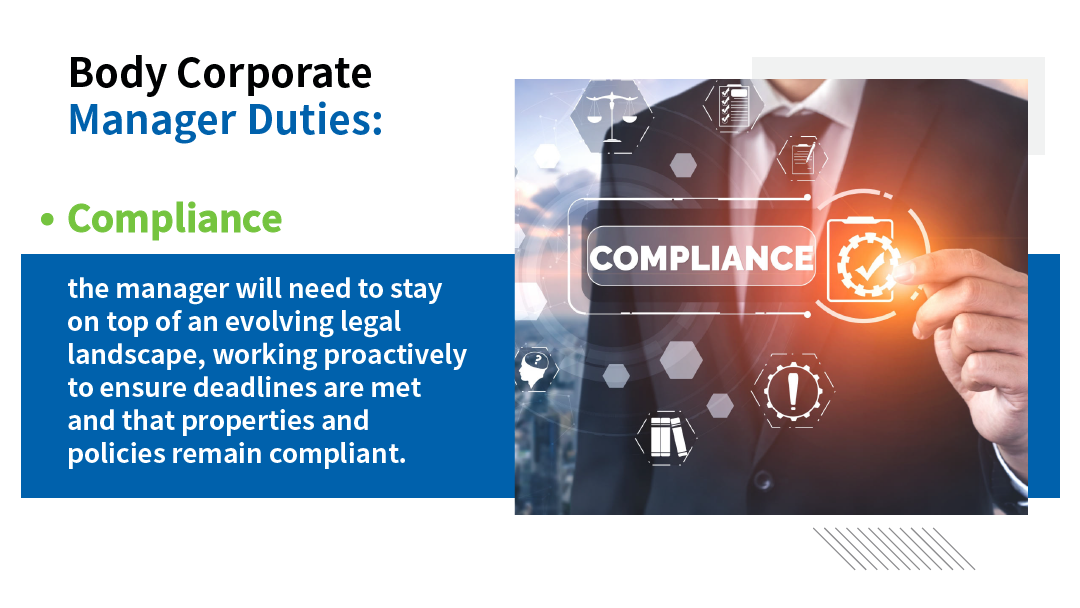
Drafting and Enforcing Rules
Strata or body corporate properties will be governed by rules (often called House Rules or By-Laws) that must be adhered to by all property owners and their tenants. It is the manager's job to help draft and oversee these rules, as well as to help the body corporate committee properly enforce them.
Additional Duties
The duties listed above are not exhaustive. Your management agreement may feature other duties and requirements specific to your situation.
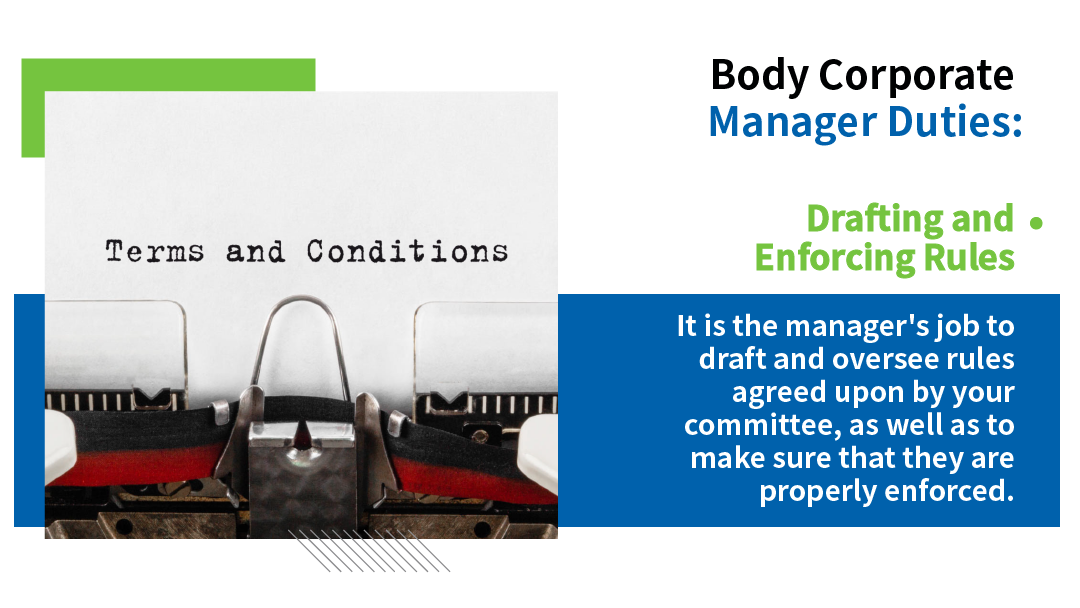
The Skills Required of a Body Corporate Manager or Strata Manager
- High levels of organizational skills
As noted above, the duties of a manager are extensive and complex. This means the right manager for you will be highly organized and will have systems in place to help deal with all requirements in an efficient way.
- A proactive attitude
Ongoing regulatory compliance depends on a proactive attitude from your manager. They need to be on top of reporting deadlines, as well as any other crucial dates, without fail.
- A commitment to communication

Crystal clear communication is crucial at every stage. While the manager does not need to consult your committee over everything, they should know exactly when and how to get in touch.
- A responsible approach to duties and duty boundaries
Your manager needs to be able to take responsibility for their duties. However, they also need to make sure that they do not overstep the boundaries of the duties outlined in the agreement.
- A modern response to problem-solving
There are many digital tools and platforms that strata and body corporate managers can use to carry out reporting and other duties in a secure manner. Your manager should be adept at using these in the proper way.
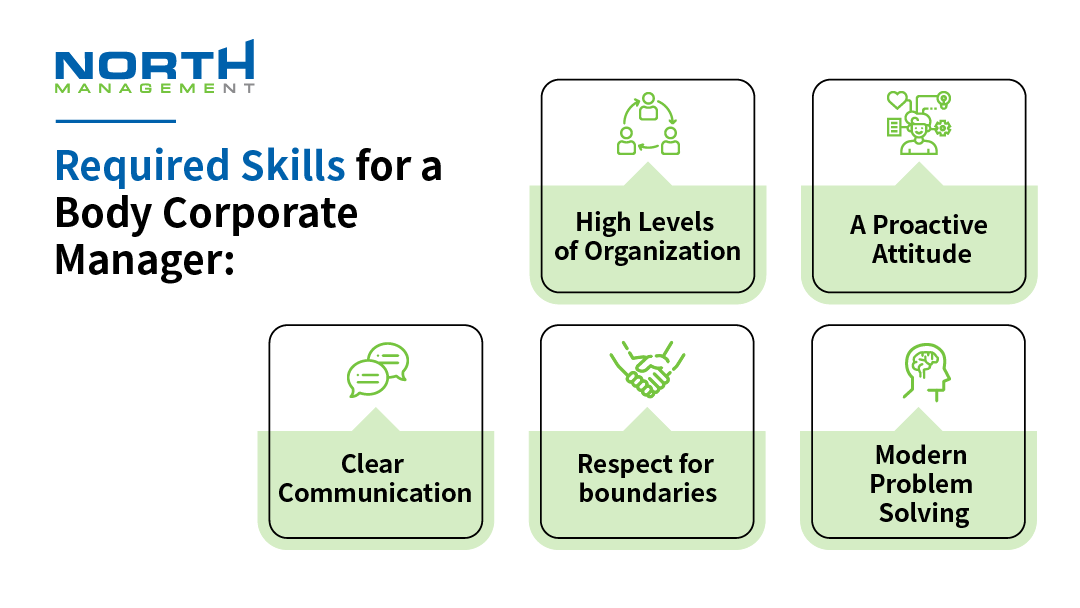
Red Flags to Watch for from Your Manager
We've explored the duties and skills expected of a body corporate and strata manager, but what about the warning signs? How will you know when it is time to change your manager, or when you need to raise key points for discussion with them? There are a number of red flags you will need to watch out for.
- Your manager is taking charge
Your manager is not in charge of your body corporate or strata. They are in place to handle administration tasks and other roles associated with ongoing maintenance and management, not to make executive decisions without consulting the body corporate committee (your representatives). All of this will be outlined in the management agreement, and the boundaries of this agreement must not be overstepped. Don't accept managers who seek to take charge of properties and investments within the body corporate or strata. Even minor renovations will require a vote of approval before they can be given the go-ahead in most cases — your manager cannot make this decision themselves.
In fact, if they overstep and something goes wrong, they could land your body corporate in hot water.

- Key tasks and duties are falling to you
Appointing a strata or body corporate manager is about providing yourself with a relatively hands-off experience when investing in a rental property. If you find yourself having to complete tasks that should be handled by the manager, this defeats the purpose of hiring a manager in the first place.
- Your manager remains completely silent
The manager is responsible for handling a range of key duties, but they still need to be open and communicative with you. It's a big red flag if they are not. Don't accept poor, slow, or inconsistent communication.
- You find yourself answering communications
While some consultation with property owners is normal, you should not be fielding the bulk of communication from tenants, insurance policy providers, regulatory bodies, or other providers. Your manager should be applying their expertise to present valid options to your committee, and helping you to make a decision. If you, or other owners in the building, and often feeling lost and the committee is constantly bombarded with questions, that's a red flag that you manager has dropped the ball.

- Your body corporate or strata receives remedial action notices
In the event that the body corporate or strata is in breach of regulatory or legislative requirements, a remedial action notice may be served. This should not occur if the manager is doing their job, and certainly should not occur frequently.
- Your body corporate or strata is liable for charges and fines
Repeated or ongoing incidences of regulatory non-compliance will result in charges and fines that are imposed on your strata or body corporate. This is a major red flag, especially if costs are borne by individual lot and unit owners.
- Your manager is unable to provide you with the answers you need on a timely basis
The manager of your body corporate or strata needs to handle their duties in a highly organized manner. This means they should be able to find the answers you need to any questions or queries within a reasonable timeframe. A lack of knowledge and expertise is a red flag that you manager may no longer be a good fit for your building. This can happen when a manager who is used to handling one type/size of strata scheme takes on a larger or more complex and different type.
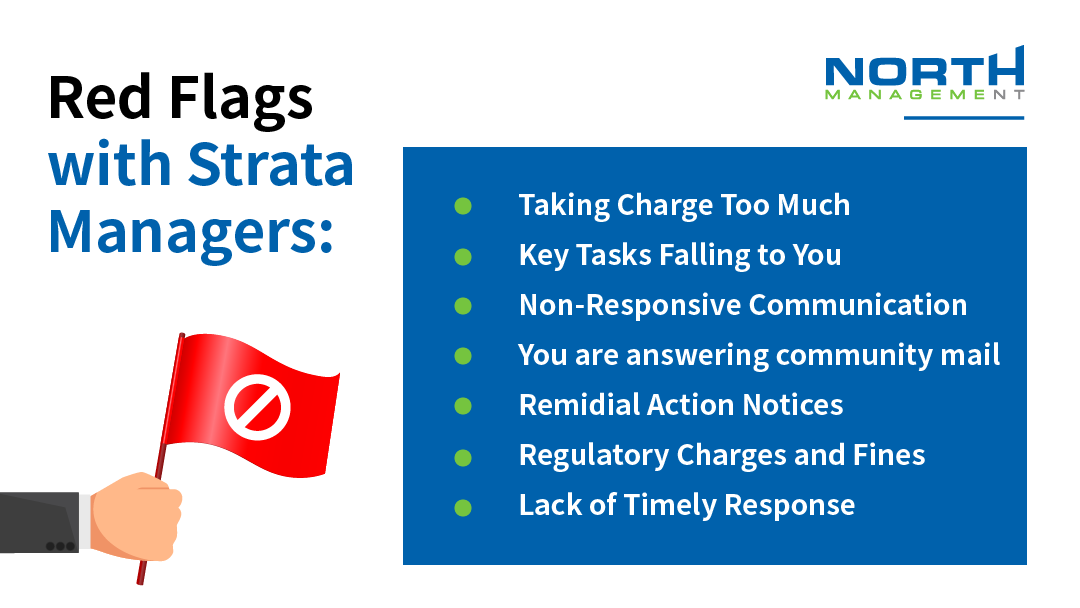
How to Change Managers and Successfully Hire a New One
Once you have identified shortfalls or inadequacies in the way the body corporate or strata is being managed, you need to reach a resolution. Your first point of contact should be the manager or managing group themselves. Raise your concerns and aim to find a workable resolution. If this fails, you may need to initiate a process of change.
If your agreement with your current manager is nearing its end, note the requirements and clauses in that agreement in relation to giving notice and agreement renewals. If the current agreement is not near to expiry, then proceed with a draft change proposal (see below).
- Draft a change proposal
Outline your reasons for why the strata manager needs to be changed. Refer to the red flags above and gather evidence that demonstrates breaches of the agreement and of general guidelines. Go into as much detail as possible to demonstrate to committee members the need for a change.
- Appraise the existing management agreement
Make sure that you and all other committee members have the opportunity to review both the proposal and the existing agreement. In some cases, the agreement will outline specific processes that need to be carried out before a manager can be removed and replaced.

- Assemble the body corporate committee
You will now need to hold a meeting of the body corporate committee. You will need the approval of the majority of committee members — or unanimous approval in the ideal case — before the manager can be removed. Holding a vote is a requirement of removing a manager, and this vote will need to be properly recorded in the meeting minutes for the resolution to be valid. Understand which Act governs your specific body corporate, as this affects which entity (the committee or the body corporate) is allowed to appoint a manager.
- Outline the requirements for a new manager
You and the other members of the committee will need to agree on what to expect from the new manager. You can refer to this document to get a picture of what a body corporate or strata manager should be able to offer to you, but all of this will need to be discussed with the committee.
- Research and find a new manager
Conducting due diligence is vital when selecting a new manager, or else you could end up with a manager who is no better than the original. As an option, you can nominate a working group within your body corporate committee and task this group with carefully researching and analyzing potential candidates. Provide a suitable time frame for finding a new manager, and interview each candidate accordingly.
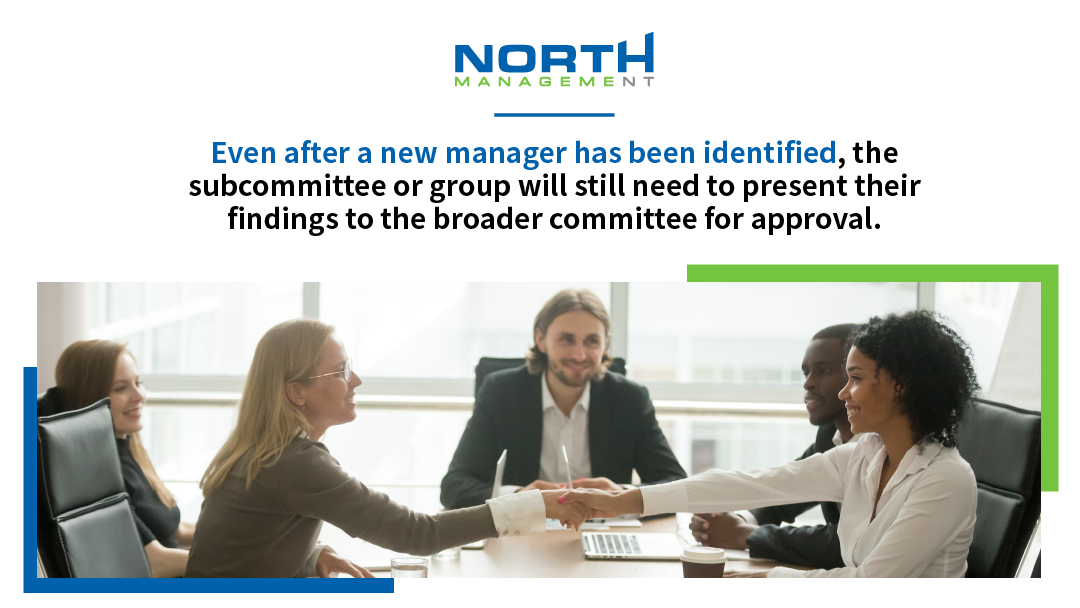
- Vet the new manager carefully
Even after a new manager has been identified, the working group will still need to present their findings to the broader committee for approval. Careful vetting will also need to be carried out on the potential new manager, and other committee members need to be able to have their say. If necessary, the working group may need to adopt a new course of action according to the wishes of the broader committee.
A new management firm should make this very easy for you to do, providing ample demonstration of who they are, what they do, how they can help you, and what you should do next.
- Hold a General Meeting
Depending on which Act governs your body corporate, you may need to hold a General Meeting to confirm the new manager's appointment. Note, under the older Act the Committee can directly appoint a new manager with no need for a General Meeting. You should document this meeting and its minutes thoroughly and retain the records for future assessment and reference. A quorum of body corporate members (owners) should be present at a General Meeting to minimise delays in finalising decisions.
- Follow the transition
The new manager will be able to walk you through the transition. Follow their lead to set the groundwork for a successful change. It will be important to ensure that you remain on civil terms with the previous manager so that they can help you in making the change as smooth and as positive as possible.
- Complete the transition
Work with your new manager to help get them up to speed on your building so they can start performing at the level your body corporate requires.

Learn More About Selecting the Right Manager for Your Body Corporate or Strata
To discover more about what to expect from your manager or about appointing a manager that best suits your needs, reach out to our team today.

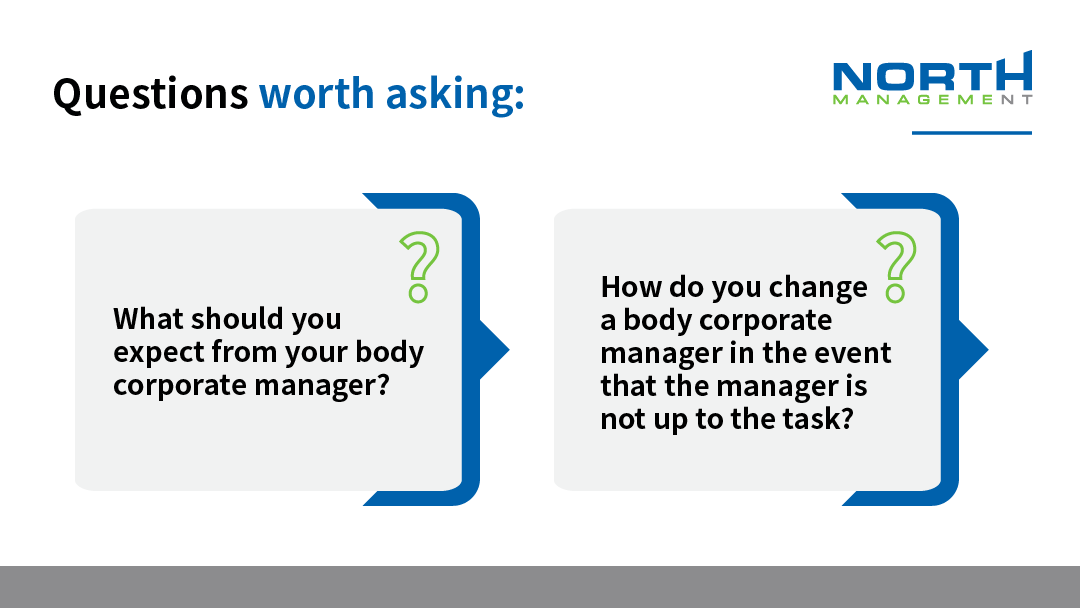


No comments:
Post a Comment